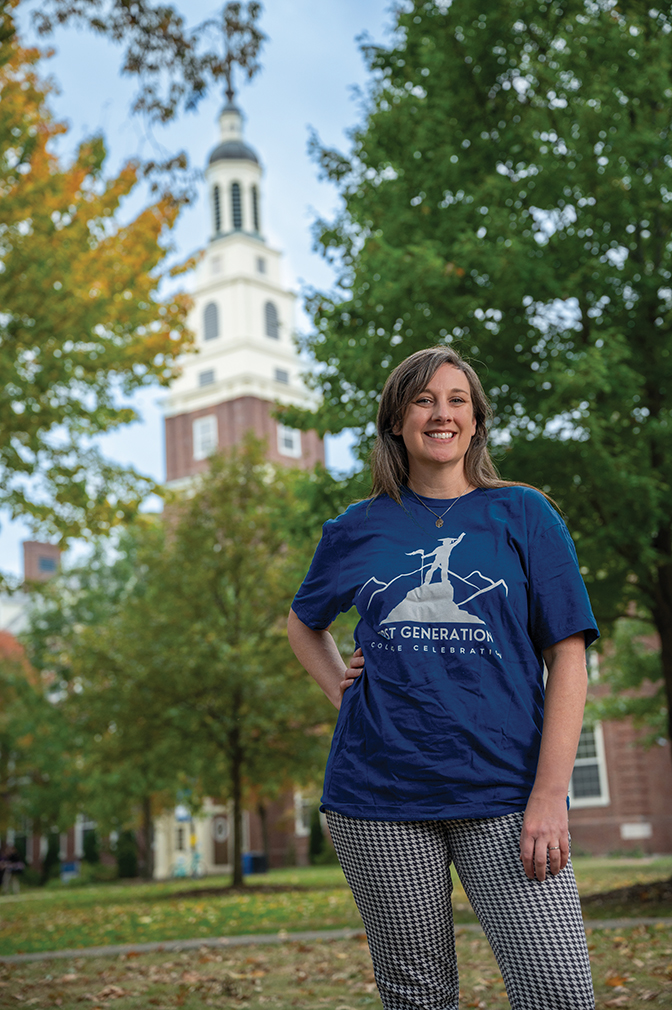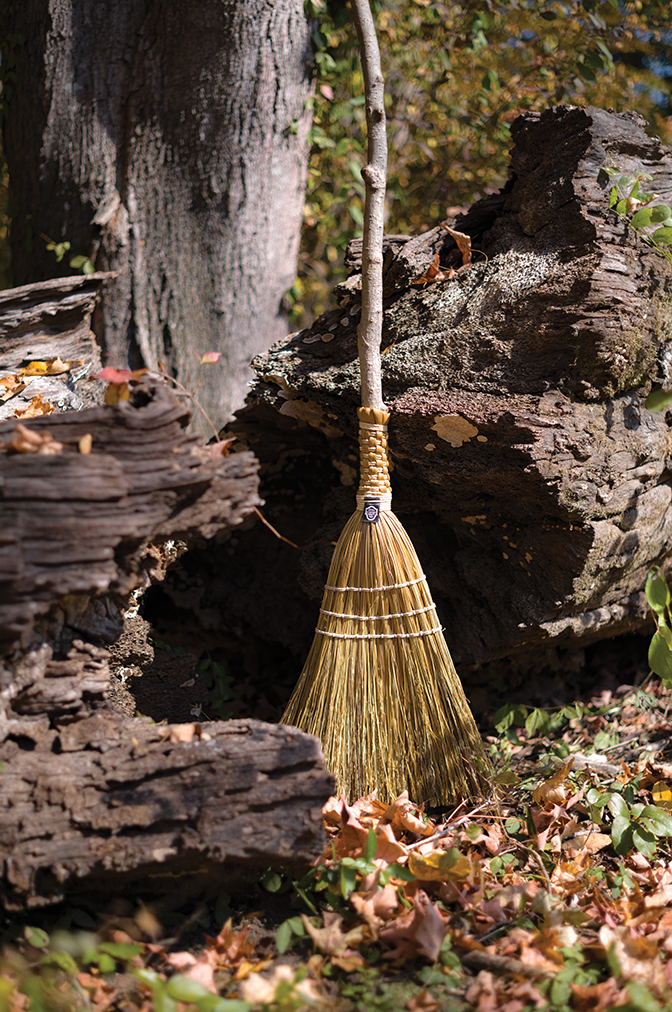
On a service trip to Ghana in 2003, Denessa Baters McPherson ’05, upon meeting the village chief, asked about acquiring a Ghanaian broom to take home.
“Why do you want a Ghanaian broom?” he asked her. “They fall apart.”
McPherson, who had been working in a village for people with disabilities, explained she wanted to take one to her father, a broom maker.
The chief was astonished. “Two years ago,” he told her, “I had a dream that an American broom maker would come and teach us.”
In his office, he showed her the illustrations of the brooms from his dream. “Have you ever seen anything like this?” he asked.
“They were Appalachian turkey-wing brooms,” McPherson related. “‘Absolutely,’ I said. ‘I’ve made these before. My dad makes these all the time.’”
“Will he come?” the chief inquired. “Will he teach us how to make brooms so we can sell them and so the people can find value and worth in what they do?”
The Broom Maker’s Daughter
“Dad, I know how to make brooms,” Denessa told her father, Dennis Baters, after he pointed out the Berea College tag attached to the latest broom in his antique collection. He was encouraging her to apply to the college, but following in her father’s sweeping footsteps was not appealing to her.
Nevertheless, she became intrigued by Berea’s mission and reputation. McPherson was eager to leave the off-grid homestead where she had lived the past five years. In a previous life, she was an Oklahoma City suburbanite, a mainstreamer. Her parents yearned for a more bucolic existence and put the
house up for sale.
But the deal went bad, and the family ended up living in their truck. For about six months, fifth-grade Denessa slept in the cab, her parents under the capper in the back. Dennis earned his money in junk sales, traveling to flea markets and antique shops. Eventually, atop a rocky ridge, the family found an unfinished cabin. The Baters became homesteaders.
“We grew more rocks than potatoes,” McPherson said. “The goats ran away because the fence didn’t hold. We ate government peanut butter, donated by friends because Dad would not sign up for government assistance. I was homeschooled. I had no friends. I lived on a mountaintop and read books.”
By the time she was 16, life off the grid improved. The family moved to a 20-acre homestead on Bear Creek in the Kiamichi Mountains in southeastern Oklahoma. The goats stuck around. They had chickens, a garden, a wood stove. McPherson’s bedroom was a 12-foot Shasta travel trailer. She immersed herself in history, becoming interested especially in the Civil War.
McPherson enjoyed learning, but when she discovered how expensive her homeschool curriculum was, she dropped out and looked for work instead. Before turning 18, she decided to join family members in Indiana to explore the restaurant business during a “gap year.”
“My mother said I wasn’t allowed to leave the house until I got my GED, took the ACT and applied to at least one college,” she recounted.
She took her tests and applied to Berea College and nowhere else.
“The letter from Berea came in the mail,” she said. “I couldn’t even open it. Someone else had to read it to me. I knew that if I was in, I was supposed to do it; I was meant to.”
The Imposter
The first semester at a prestigious college known for academic rigor can be tough on a homeschool dropout. Though excited and buoyed by apparent providential destiny, McPherson had never written an essay in her life. Worse, all her new classmates seemed like naturals at it.
That was almost reason enough to quit and head back to Indiana, where she could continue the career she began the year before. She approached Dr. Jill Bouma, the sociology professor who assigned the essay.
“I don’t know what I’m doing here,” McPherson told her. “If I can’t write something that everybody else thinks is the simplest thing in the world, then I don’t belong here. I’m not as smart as these kids. I don’t know what these kids know. I can’t do it.”
Dr. Bouma wasn’t interested in feeding the young student’s imposter syndrome.
“She took me aside and said, ‘Nope, that’s not who you are,’” McPherson recalled. ‘“We’re going to learn how to write this essay.’ Because of her, I was able to finish that class.”
If she could finish that class, she could finish college, she thought.
She declared a major in communication, which was offered for the first time beginning her sophomore year.

Sweeping Change
In Ghana, not long after McPherson decided to stick with it, she told the chief she would ask her father about teaching them to make brooms, but he was 50 and had never been on a plane before.
When shown the Ghanian broom and told about the chief’s invitation, Dennis said, simply, “Let’s see what the Lord does with it.”
He went right to work on the idea, understanding that if he were to do this, he would need to create a broom machine that the disabled people of the village could use. A standard machine requires the use of hands and feet simultaneously.
“Some in the village had use of their hands,” McPherson explained. “Some had use of their feet, but not both hands and feet. Some were blind. Some were deaf.”
In Texas, Dennis set up his broom machine at an event to demonstrate. He posted a sign that read, “Ask me about Africa.” A man named Bert Seale happened by and asked him about it. Dennis explained he was trying to create a broom machine that could be worked by two people, with one using their hands while the other used their feet, and of a certain raw material indigenous to the region. He needed a specific kind of part that no one made.
Bert, an engineer, bought a broom and wished him well. The next day, he came back with a piece he had fabricated. “Will this work?” he asked. Dennis said it would and asked if he could make five more. Soon, Dennis and Bert became best friends, and Denessa had a new uncle.
The new broom machines, and the broom corn and seed to go with them, hitched a ride in a shipping container used by Wheelchairs for the World, which was already going that way. For the next three years, Dennis spent months at a time in Ghana, teaching people to make brooms and how to grow broom corn. He taught a deaf man to make brooms, who taught a blind man how, and so on.
At that time in Ghana, being disabled carried a stigma. It was widely assumed that a person or their parents had sinned, and their disability was punishment. Because of that, the broom making quickly drew attention. One day, the queen mother of the Asante Kingdom, Nana Afia Kobi Serwaa Ampem II, got word of what was happening and went to see for herself.
Dennis wore a shirt that read, “Jesus swept,” which she complimented. Someone ran up to say that her compliment meant he had to give her the shirt. So, Dennis took it right off his back and gave it to her. A short time later, the queen mother pushed for legislation that would recognize the value of the disabled and what they could contribute.
“In a way,” Denessa said, “a broom changed a nation.”
The Finishing Line
McPherson finished college, the first in her family. Her mom, Jackie, made graduation invitations by hand for “literally everyone she’d ever met.” McPherson, too, was excited and filled with sudden pride in her accomplishment and confidence for the future, understanding that she had dug deeply within herself to make it happen despite difficulty.
The next year, Denessa married Chad McPherson ’06, the day before he graduated. Chad and Denessa gave Jackie and Dennis three grandchildren who are bound for college, for a new family tradition of educational attainment and for their own fateful journeys.

